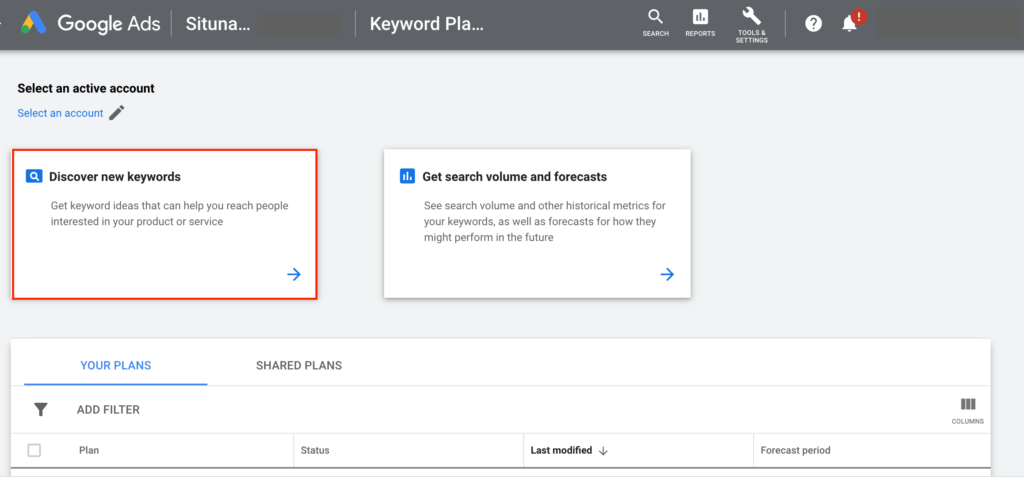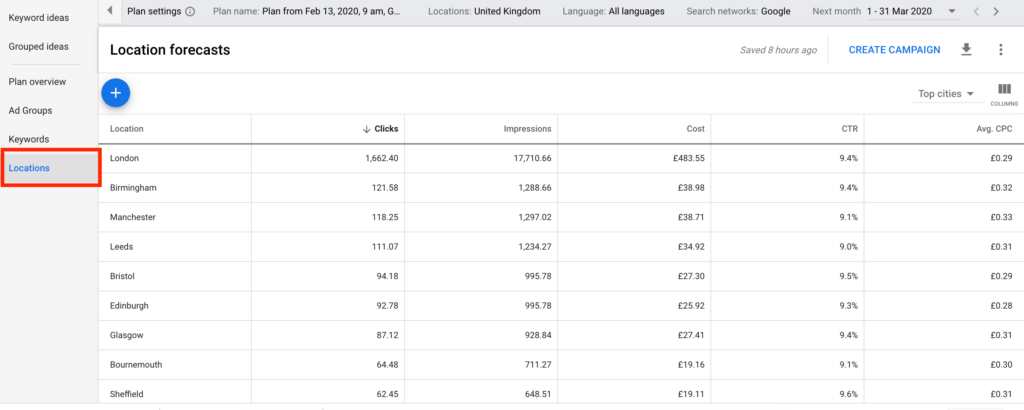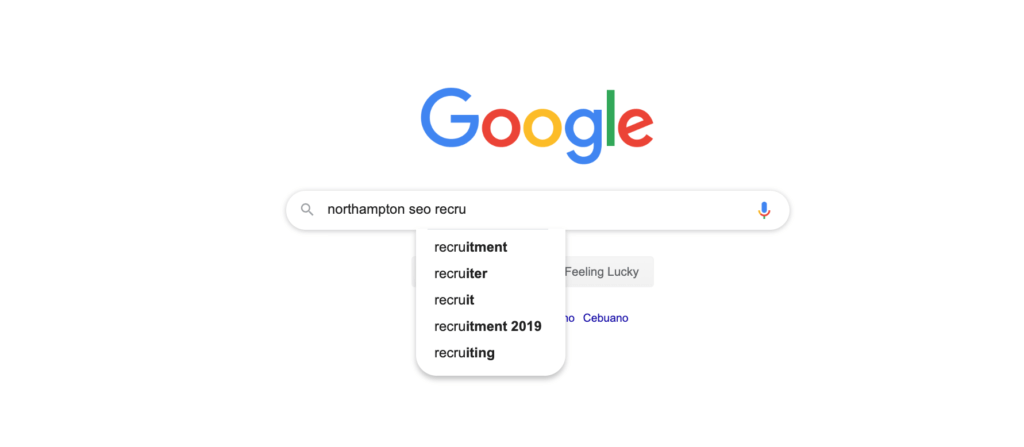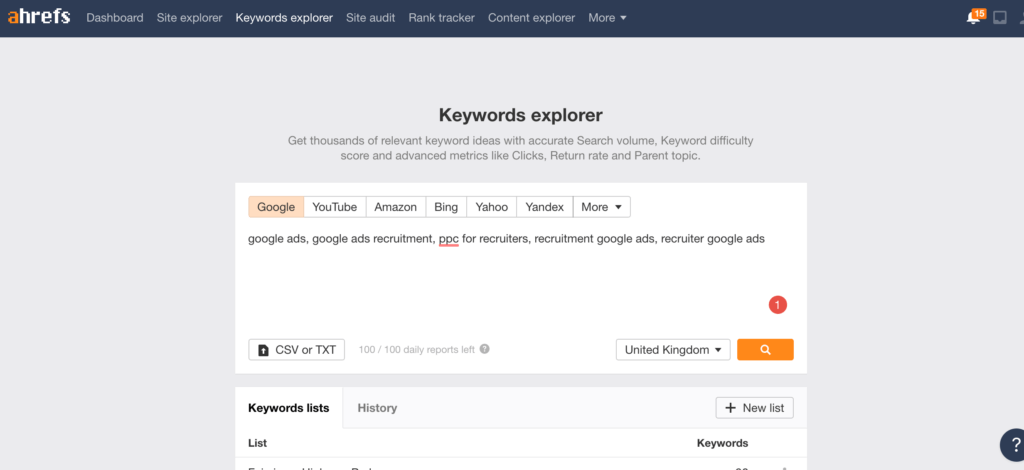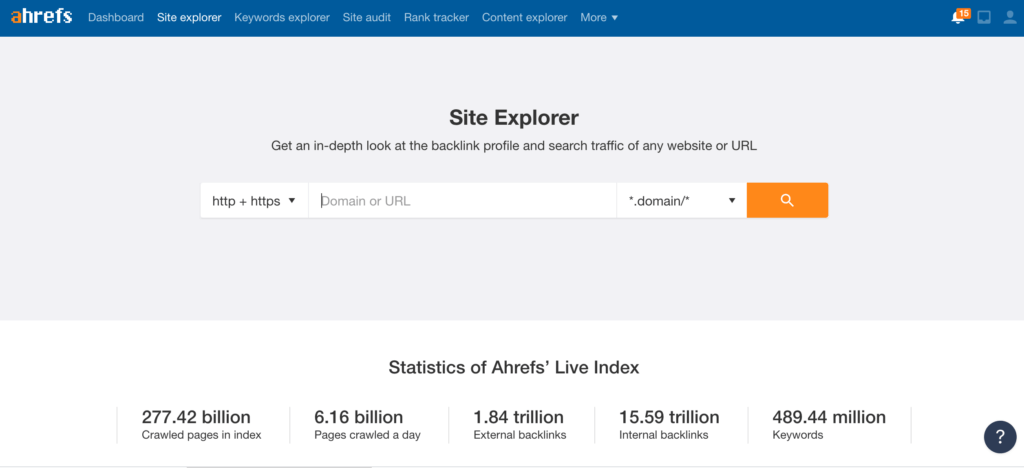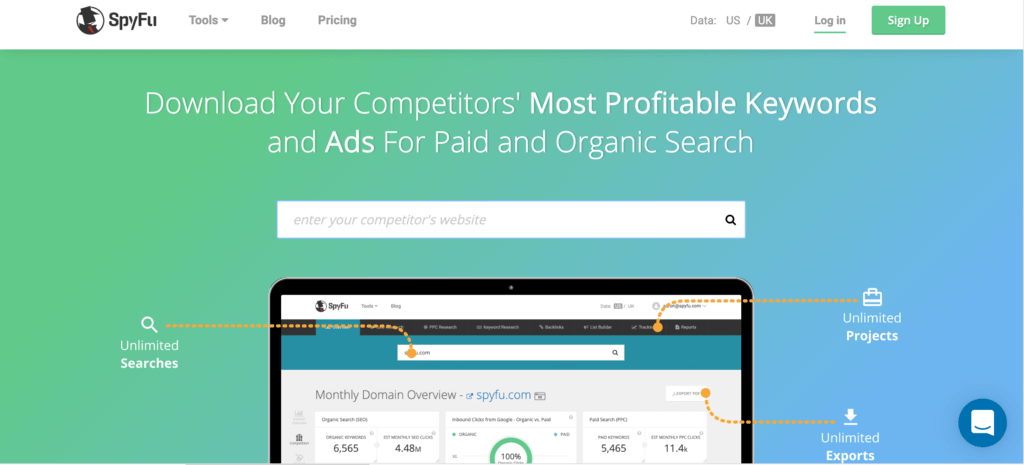
A Recruiter’s Guide to Keyword Research
These days, finding potential clients and qualified candidates to add to your talent pool can be challenging if you’re not using the right tool. Fortunately, the Internet provides recruitment professionals like you with a quick and efficient marketing tool that can help them find exactly what they are looking for. With the intense competition these days, however, it’s important to have the right digital marketing strategy to ensure that your target audience can easily find you online.
Google may have changed its search algorithms many times, but one thing remains the same. Keywords play a vital role in getting good rankings on search engine result pages or SERPs. By using the right keywords, it will be easier for job hunters and companies who might need your services to find you.
To find the right keywords to use for your digital marketing campaign, you must conduct keyword research first.
What is Keyword Research?
All digital marketing campaigns should be founded on solid keyword research. If you want your marketing strategy to be effective and successful, you should determine the keywords or key phrases you must use throughout your campaign.
So what exactly is keyword research? Keyword research is the process of identifying and analysing search terms that people use to find certain information online. The amount of data it can provide can come in handy when developing and running an online marketing strategy. It can also help you pinpoint the type of content your audience might like.
Keyword research can also give you a glimpse into the mindset of both job seekers and employers. It allows you to get to know them better by providing you with an insight into their thoughts, fears, and desires.
Why Keyword Research is Important
For many recruitment agencies, running an SEO or content marketing campaign can be tricky these days. In recent years alone, Google has made several updates to its search algorithms. Before, recruiters can rank well on SERPs by having content with the exact search terms used by people looking up specific information online. Now, Google prioritises content that matches a user’s search intent instead.
However, this doesn’t mean that keyword research is no longer an essential part of digital marketing. Here’s why.
1. It helps you identify the type of content you should create
Keyword research should be a part of every recruiter’s digital marketing strategy because it tells you what sort of content job seekers and employers might be interested in. Also, it helps you determine how popular a particular topic is amongst your target audience.
By having access to this information, you can improve your current content marketing strategy. You’ll be able to craft content that can fulfill your audience’s needs and match their search intent. This, in turn, can help you get better search rankings.
2. It provides you with more organic traffic
Skipping keyword research can put you at risk of targeting keywords and topics your audience might not be interested in. It is because even if you have comprehensive and well-crafted content, it won’t help you attract organic traffic if it contains keywords with no search volume.
If you don’t want your content to go to waste, you should research the keywords you need to use. This way, not only can you obtain more organic traffic but you can also help your content get good rankings on SERPs.
3. It helps you avoid topics that are too competitive
A keyword or a topic’s popularity is not the only thing you can determine with keyword research. It can also help you gauge how difficult it can be to rank for them. A keyword is considered highly competitive if it has high revenue potential. For example, the topic or keyword “SEO” is highly competitive because it has significant monthly search volume and many websites are making money off it.
Google Keyword Planner is a tool that you can use to obtain this information. For instance, in paid search, you can determine how competitive a keyword is by looking at its CPC (cost per click) under the “Competition” column. The higher a keyword’s CPC is, the more difficult it is to rank for it.
With access to this vital information, you know better than to waste your time and effort on a topic or keyword that is too competitive. To get the best result possible, you should find better alternatives to the topic/keyword you want to initially rank for.
4. It helps with on-page optimisation
On-page optimisation is the process of improving certain elements of your website, such as your meta descriptions, title tags, and URLs, to improve its search ranking. It is common knowledge that on-page elements play a role in how websites rank. Whilst Google has yet to confirm this, several studies, including this one made by Backlinko, showed that there is indeed a correlation between getting good search rankings and having excellent on-page optimisation strategies. In particular, this graph by Pressidium.com showed that websites with keywords on their title tags ranked higher on SERPs.
Keyword research allows you to identify the best keywords to use in on-page optimisation. Whilst it remains unconfirmed if a site’s on-page elements have something to do with its search rankings, it’s best to be prepared. As such, it would be wise to continue having relevant keywords in your site’s on-page elements.
5. It helps you identify new opportunities
Keyword research helps you better understand job seekers and employers. It gives you a glimpse into their thoughts, fears, and desires. This knowledge is an invaluable tool that can help not only with your marketing efforts but also with the way you run your business.
With a better understanding of your audience, coming up with ideas that could give you more enquiries would be a cinch. It could even help you identify new locations where your services could be needed.
Conducting Keyword Research
Now here comes the fun part: doing keyword research. When researching keywords, you must be patient because there is more to do this task than identifying the keywords you need to use. Here are the steps you should follow.
1. List down some information about your company
The first step is to get to know your business as much as possible. This will serve as your guide as you conduct your research and could even help you develop various pieces of content for your business later on.
You probably already know a lot about your company, but to ensure that you won’t miss anything, here are a few questions you should ask yourself:
- What services do I offer?
- Who are my clients?
- How are they searching for my services?
- Why do they need my services?
Once you have listed down the answers to these questions, let’s proceed to Step No 2.
2. Create a list of topics
Next is to create a list of topics based on the information you have collected about your company. Since you’re in the recruitment business, some of the topics that could be relevant to your audience include:
- Job application tips
- How to recruit new employees
- Common job interview questions
- How to interview a candidate
- How to pass a job interview
Are you having difficulty coming up with more topics? If you are, consider putting yourself in the shoes of your clients. Then, as a job seeker or a business owner looking for someone to fill in a vacant position in your company, ask yourself what kind of topics you would find useful or interesting. This should give you plenty of ideas.
3. List down all relevant keywords
After creating a list of topics, the next step is to identify all related keywords. These are the search terms you think your clients would use when looking up the topics you’ve listed. Using the topics above, some search terms your customers might use include:
- Job application
- Applying for a job
- Employment tips
- Job interview
- Job interview questions
- Passing a job interview
- Employee recruitment
Next is to determine how popular these keywords are by using a keyword research tool. As mentioned earlier, the more popular or competitive a keyword is, the more difficult it is to rank for it, especially in organic search. If you don’t want to waste your time on popular keywords, consider search terms with low search volume. However, make sure you don’t go too low. Otherwise, you might be unable to attract any searchers to your site. The trick here is to target very specific keywords with lower competition.
4. Look for related search terms
Identify the search terms related to your topics/keywords. Enter a particular keyword on Google and take note of the related search terms or search suggestions that will appear at the bottom of the SERP. These related search terms could help you identify the keywords that you might have overlooked before.
Another method is to use ahrefs.com. You must subscribe to their services first but you can try their analytics tool for free for seven days. Once you sign up, group the keywords on your keyword list into categories. Expand each category using ahrefs.com’s Keyword Explorer tool. Click on each parent topic under the ‘Parent Topic’ column in the results list page. Then, choose the relevant keywords you can add to your list.
5. Consider long-tail keywords
As the name implies, long-tail keywords are search phrases that contain four words or more. They are often longer and more specific than general search terms. Compared to general search terms, long-tail keywords are less popular, receiving less than 100 searches every month.
Despite their low popularity, however, long-tail keywords should not be underestimated. More often than not, they convert better than general search terms because the people who use them are more specific and intentional in their searches.
For instance, someone who conducts an online search using the keyword “jobs” is probably not seriously looking for employment at the moment. On the other hand, someone searching for “entry-level accounting jobs in Northampton” is most likely asking local recruitment agencies for help. This is why it’s important to have a mix of general search terms and long-tail keywords because it allows you to develop a well-balanced keyword strategy.
6. Check out the competition
Don’t forget to determine the keywords your competitors are trying to rank for. Whilst you don’t necessarily have to do everything they’re doing, you should check the competition so you can come up with a better keyword strategy.
For example, if another recruitment agency is ranking well for the keywords “UK health and safety jobs” and you’re not, you should re-evaluate your current strategy to improve your search rankings for these keywords. Apart from this, you should also take note of the keywords your competitors are not using. This can help you identify keywords that may be useful but not that difficult to rank for.
You can use paid analytics tools to get a feel of your competitors’ keyword strategy. But if you want to do it without spending money, simply use incognito mode on your web browser. Then, manually Google recruitment-related keywords and see how your competitors rank on SERPs.
On the other hand, if you want to complete this task quickly and efficiently, you can use ahrefs.com or spyfu.com. On ahrefs.com, click on ‘Site Explorer’ and then type the URL of your competitor into the search box. Navigate to ‘Organic Keywords’ to see the list of keywords your competitors are trying to rank for.
On spyfu.com, click on the ‘Overview’ tab and then enter the URL of your competitor. There you will see a wide range of information about their website, including their top organic keywords, monthly SEO clicks, and organic and paid competitors.
7. Refine your keyword list
Before you launch your digital marketing campaign, weed out unnecessary keywords to ensure that you’ll use only the best and most relevant ones. An effective way to refine your list is to use Google Keyword Planner and Google Trends. To do this, you should set up a Google Ads account. Don’t worry though. You don’t need to create an ad to use this tool.
With the help of the Keyword Planner, determine the search volume and traffic estimates of the keywords you want to rank for. Then, remove the keywords with duplicates and those with either too little or too much search volume. Don’t forget to check the keywords’ trend history and projections first with Google Trends, too. This will help you determine if a low-volume keyword could help you later on.
Another way to trim down your keyword list is by targeting specific locations in the Keyword Planner or evaluating “interest by sub-region” in Google Trends. Geo-specific keyword research is a great way to make your content more relevant and relatable to your audience. For instance, you might discover that in Location A, accounting jobs are more in demand, whilst in Location B, medical jobs are more popular.
Conclusion
Thorough keyword research should be the cornerstone of any digital marketing strategy. Not only does it help you optimise your website and content for search engines, but it also helps you develop a better understanding of your target audience. More importantly, it enables you to create an effective and efficient digital marketing strategy.
As competition amongst recruitment agencies becomes more intense, it is important to ensure that job seekers and employers can easily find you online. This is why you must never skip keyword research as it can bring your digital marketing campaigns to the next level.
Do you need help with keyword research? At Recruitment Traffic, we are happy to assist you. Contact us today to get the digital marketing solutions you need.
Drive Your Recruitment Business Towards The Best Results.
Talk to us about how we can help.
